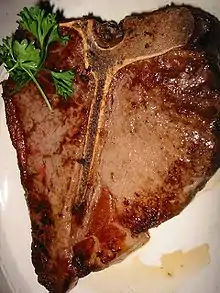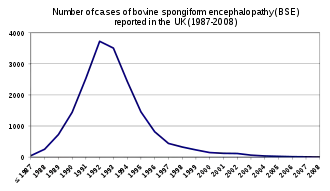Beef Bones Regulations 1997
The Beef Bones Regulations 1997 were a statutory instrument of the British government that limited the sale of beef on the bone. The regulations were implemented as a response to the United Kingdom BSE outbreak (mad cow disease) over fears that variant Creutzfeldt–Jakob disease in humans might be caused by the consumption of dorsal root ganglia, which lie near the bone. As well as beef on the bone, all beef-bone derived products were prohibited from sale. This had the effect of outlawing T-bone steaks, prime ribs and oxtail as well as some soups and stocks. Other aspects of the regulations dealt with the deboning of beef and the keeping of records in the food production industry. The restrictions on sales were lifted in December 1999 and the regulations as a whole were revoked in April 2008.
| Statutory Instrument | |
.svg.png.webp) | |
| Dates | |
|---|---|
| Commencement | 16 December 1997 |
| Text of the Beef Bones Regulations 1997 as in force today (including any amendments) within the United Kingdom, from legislation.gov.uk. | |

Background

The regulations were among 60 issued by the British Ministry of Agriculture, Fisheries and Food before the end of 1997 to combat the outbreak of bovine spongiform encephalopathy (BSE) in cattle.[1] BSE is a neurodegenerative brain disease of cattle, transmissible by the consumption of contaminated brain or spinal tissues. It has been linked to variant Creutzfeldt–Jakob disease (vCJD) in humans. BSE was first detected in the UK in November 1986 and measures were taken from 1988 to restrict contamination in the food chain such as through meat and bone meal (MBM). The European Union banned the use of all mammalian-derived MBM for feeding of ruminants in 1994. From 1996 restrictions on the sale of British beef were put in place by some countries.[2]
Regulations

The stated purpose of the regulations was "to protect public health and maintain confidence in beef and beef products".[3] They were a statutory instrument (SI) made under the powers granted by the Food Safety Act 1990, applied across Great Britain and came into force on 16 December 1997.[4][5] The Minister of Agriculture, Fisheries and Food at the time the regulations were implemented was Jack Cunningham.[6] While the regulations only extended to Great Britain, comparable restrictions were brought in for Northern Ireland as a statutory rule, the Beef Bones Regulations (Northern Ireland) 1997, under the powers in the Food Safety (Northern Ireland) Order 1991.
The regulations prohibited the sale of any beef on the bone (from animals aged 6 months or older) and restricted the use of beef bone material in food products for human consumption.[4][5] They also banned the deboning of beef anywhere except in a recognised food processing premises and created a responsibility for the operator of such premises to ensure that deboning was carried out in such a manner as to prevent contamination of food stuffs. The regulations also specified how beef bones should be stored and required food producers to keep records pertaining to the origin of their beef. The ban on the sale of beef on the bone came into force immediately, and food producers were granted a three-month period to implement the other aspects of the regulations.[5]
The regulations were imposed because of fears that previous practices risked contamination of foodstuffs by dorsal root ganglia, nerve tissue found close to the bone, and mechanically recovered meat.[7][8] The measures were recommended by England's Chief Medical Officer (CMO), Kenneth Calman.[9] The regulations made illegal the sale of previously accepted foodstuffs such as T-bone steaks, prime ribs and oxtail.[1][9] The sale of soups and stocks derived from or flavoured by beef bones were also banned.[9] At the time of the ban beef on the bone accounted for 5% of all British beef sales.[3]
There were protests against the ban, which some consumers saw as an over-reaction to the risk of vCJD infection by a patriarchal government, and the National Farmers' Union of England and Wales criticised the measures.[9][3] A march on Downing Street was held by butchers, consumers and meat industry personnel after which the prime minister Tony Blair was presented with a rib of beef.[3] The regulations were criticised in the tabloid press and the Worshipful Company of Butchers held a six-course dinner to "say goodbye to the roast beef of Olde England" at which diners wore black armbands.[3][10] The first prosecution under the regulations was rejected by Scottish Sheriff James Paterson at Selkirk's sheriff court on 21 April 1998,[11][12] but on 26 June 1998, an appeals court instructed Paterson to rule on the case.[13] Prince Charles was illegally served beef on the bone at a Newport hotel in 1999 but the proprietor escaped prosecution.[9]
Amendment and revocation
On 30 November 1999 the Minister of Agriculture, Fisheries and Food Nick Brown announced that the regulations would be relaxed to permit the sale of beef on the bone. Chancellor of the Exchequer Gordon Brown hinted strongly that there would be no prosecutions for sales made between that date and the formal issuing of the amendment to the regulations (which came on 17 December 1999).[5][9] The relaxation followed a review of the evidence by the medical officers of all four countries of the United Kingdom, which concluded that the risk of transmission had sufficiently declined.[9] The opposition Conservative Party claimed the ban had cost the British beef industry millions of pounds and should never have been imposed.[9] The relaxation was made by separate statutory instruments in England, Wales and Scotland because of the effects of devolution since the original SI's enactment. There was some discussion over whether separate policies should be maintained in the home nations of Great Britain, as the Chief Medical Officers for Scotland and for Wales wanted to retain the restrictions for longer than did their counterpart the CMO for England.[14]
Incidence of BSE continued to decline and the European Union ban on British beef exports was lifted on 1 May 2006.[15] The Beef Bones Regulations 1997 were revoked in April 2008. This led to an increase in the production of desinewed meat, recovered from beef bones, that was sold as mechanically separated meat. The Food Standards Agency banned this production in 2012.[16]
References
- Booker, Christopher; North, Richard (2007). Scared to Death: From BSE to Global Warming: Why Scares are Costing Us the Earth. London: A&C Black. p. 117. ISBN 978-0-8264-7620-3.
- "Bovine spongiform encephalopathy". WHO. November 2002. Archived from the original on 2012-12-18. Retrieved 13 October 2020.
- Szmigin, Isabelle (2003). Understanding the Consumer. London: SAGE. p. 24. ISBN 978-1-4129-3356-8.
- D'Mello, J. P. Felix (2003). Food Safety: Contaminants and Toxins. CABI. p. 425. ISBN 978-0-85199-751-3.
- "Title: Beef Bones Regulations". Agricultural Document Library, University of Hertfordshire. Department for Environment, Food and Rural Affairs. Retrieved 13 October 2020.
- "Parliamentary career for Lord Cunningham of Felling". UK Parliament. Retrieved 13 October 2020.
- Comer, Philip J.; Huntly, Paul J. (1 July 2004). "Exposure of the human population to BSE infectivity over the course of the BSE epidemic in Great Britain and the impact of changes to the Over Thirty Month Rule". Journal of Risk Research. 7 (5): 523–543. doi:10.1080/1366987032000123865. ISSN 1366-9877. S2CID 144307500.
- "Beef Bones Regulations 1997 (Hansard, 27 January 1998)". api.parliament.uk. 27 January 1998. Retrieved 16 October 2020.
- Meikle, James (1 December 1999). "Brown lifts beef on the bone ban". The Guardian. Retrieved 13 October 2020.
- Sparks, Colin; Tulloch, John (2000). Tabloid Tales: Global Debates over Media Standards. Lanham, Maryland: Rowman & Littlefield Publishers. p. 206. ISBN 978-1-4616-4385-2.
- "Court castigates beef-on-bone ban". independent.ie. 22 April 1998. Retrieved 14 October 2020.
- The Edinburgh Law Review. 1998. p. 254.
- Quinn, Joe (27 June 1998). "Judges reinforce beef on bone ban". independent.co.uk. Retrieved 14 October 2020.
- Page, Edward (2001). Governing by Numbers: Delegated Legislation and Everyday Policy-Making. Oxford: Hart Publishing. p. 190. ISBN 978-1-84113-207-5.
- "End to 10-year British beef ban". BBC News. 3 May 2006.
- Great Britain: Parliament: House of Commons: Environment, Food and Rural Affairs Committee (2012). Desinewed meat: fifth report of session 2012–13, report, together with formal minutes, oral and written evidence. London: The Stationery Office. p. EV 49. ISBN 978-0-215-04725-0.